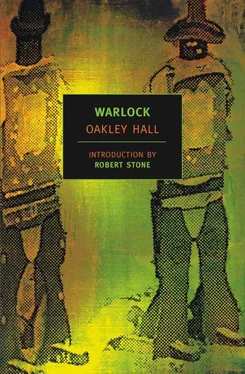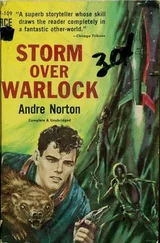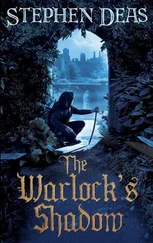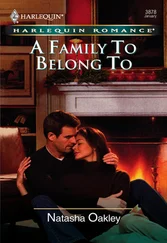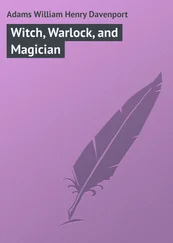“How did you break it?” Kate asked.
“Fight,” he said. “Well, Billy did it,” he said reluctantly. “We got in a fight and he hit me with a piece of kindling. He had a temper.”
Silently she rose and went into the kitchen. She brought back the coffee pot and poured steaming coffee into the two cups. When she had seated herself again, she said, “The first time you talked to me you knew he was going to kill your brother. Didn’t you?”
“I guess I did.”
When she seemed to change the subject he was grateful: “Where were you from before Nebraska?”
“From Pennsylvania to begin with. I don’t remember it much.”
“Yankee,” she said.
“I guess I am. Where are you from, Kate?”
“Texas.” She sat very stiffly, not looking at him now but attentive, as though she were listening to something within herself. She said, “I don’t know about Yankees. In Texas if a man killed your brother you went after him.”
He picked up his cup. The coffee burned his tongue but he drank it anyway, and when he put the cup down he spilled coffee in a thin brown stain on the oilcloth.
“But you’re not going after Blaisedell,” Kate said, in a flat voice.
He shook his head. “No.”
“Afraid of him?”
“I have got no reason to be afraid of him.”
She shrugged her shoulders. All at once she seemed very cold, and bored.
“Men brace people they are afraid of,” he said. “That’s nothing to do with it. I just don’t expect I have to set out to kill a man because some people think I ought to.”
“Who?” Kate said.
“Some people here. But I am not going to go against Blaisedell just because I don’t want people to think I am yellow. I don’t care that much what they think of me.” He felt himself flushing, as though he had been caught in a brag. Kate was looking at the star on his shirt, her mouth tucked in at the corners.
“Meaning what I think?” she said.
“Why, no. Anyhow all that is nothing to do with it. It’s that I don’t see how any blame is due Blaisedell. Or not — not much.”
“You have called him not guilty before the jury in Bright’s City got around to it, have you?”
“Well, it was self-defense clear enough, when you come down to it. They’d come in to kill him. Billy told me that.”
Kate drank her coffee. Her eyelashes made delicate shadows upon her white cheeks. He finished his own coffee, disappointed and ill at ease in this silence. Finally he said, “Well, I had better be going now, Miss Dollar.”
“Kate,” she said. “No, don’t go yet. There might be somebody coming by and I think I had better have a man here.”
“Who?”
“The jack I rented this house from. I thought he might be planning on paying a call.”
He nodded, and he felt better. She poured another cup of coffee, and he said, “You said you knew Blaisedell in Fort James?”
“I knew Tom Morgan. If you knew him you knew Blaisedell.”
“What did they think of Blaisedell in Fort James, Kate?”
She didn’t answer right away, and he saw the tightening in her face. She said, “About the same as they do here. The way they feel about a badman anywhere. Some like him because they think if they show they like him he’ll like them. Others don’t like him and stay out of his way. People are the same most places.”
Her black eyes met his expressionlessly as she went on. “He dealt faro for Morgan and people knew he was a gunman from the start. Though nobody knew anything about him. Then one day a man named Ben Nicholson came in. A real bad rattlesnake of a man. He was shooting things up. Drunk and cursing everybody and trying to get a fight. He was trying to get the marshal to fight. So Blaisedell went to the marshal and said he’d brace Nicholson, and the mayor heard him and fired the marshal and made Blaisedell marshal. So Blaisedell went out in the street and told Nicholson to get out of town. Nicholson drew on him so Blaisedell killed him.”
She stopped, but it didn’t sound as though she was finished, and he waited for her to go on.
“So he was marshal but he still worked for Morgan,” she said. “Morgan had given him a quarter interest in the place he had there.”
“A lot of marshals do that.”
“I didn’t say there was anything wrong with it.”
“I’m sorry. I didn’t mean to bust in.”
“That’s all I was going to say. He killed four or five others — bad-men mostly. That writer came and gave him those gold-handled guns. I guess you’ve seen them. I was gone by then. I left pretty soon after he killed — Nicholson. Fort James was dying off by then and everybody was beginning to move on.”
“What did you mean,” he said slowly, “that the four or five others was badmen mostly? ”
She said, in a voice so thick he could hardly understand her, “I am sick and tired of talking about Clay Blaisedell and who he killed.”
“I’m sorry. I guess it’s not a thing women are interested in much.” He tried desperately to think of something to say that would interest her, but it seemed to him that he didn’t know anything that would interest anybody. He wondered why she had gotten so angry.
“I’ve heard people saying you’d come out here to start up a dance hall,” he said, tentatively. “Seems like it would be a good tiling.”
She shrugged. Then she sighed and said, “I don’t know. Maybe I am waiting to see if this town is dying off too.” Something in the way she said it made him think it was a kind of apology for her anger, and after that it was almost all right again. They discussed the rumors that wages were going to be dropped at the mines, and she told him of the strike she had seen at Silver Mountain. She regarded him brightly now when he spoke, and so he found himself not so tongue-tied, although he marveled at how much more she knew, and had seen, than he. It was almost like talking to a man, and almost he could forget he was having supper with Kate Dollar in her house and alone, and that they were man and woman. But he would be brought back to it sharply from time to time, by something she said, or by some movement, and it was a very intense thing to him, except that it always made him begin to wonder again what had brought her to Warlock, who she was and what she was; but now he did not want to know. And he marveled too at how fine-looking she was in the lamplight, and at how soft her sharp black eyes could be sometimes, and the crooked way her mouth twisted when she smiled the smile he liked. He could not keep his eyes from the soft shadows her lashes made upon her cheeks.
Then she asked about McQuown. “What sort is he? I’ve heard a lot about him since I’ve been here, but I don’t think I’ve ever seen him in town.”
“He and Curley are in tonight. I guess on their way up to Bright’s for the trial.” He paused, to see if she was really interested; she was watching him intently. “Well, he is a rustler, mostly,” he went on. “I know him pretty well. He took Billy and me on to work for him after our father died — the Apaches’d run off all our stock.”
“How bad is he?”
He laughed shakily and said, “Why, Kate, I guess I don’t like to talk about him sort of the way you don’t about Blaisedell.”
She touched a finger to the corner of her mouth. She looked wary, suddenly. “I see,” she said. “You are against McQuown. So you are for Blaisedell.”
“No, that’s not so. Not like Carl is; not—” He stopped and looked down at his hands. “Maybe I am in a way,” he said. “For Abe is bad. Worse than he ought to be, and worse all the time, it seems like. I used to think pretty high of him.”
“But you left,” she said. “You left and your brother stayed on there.”
Читать дальше
